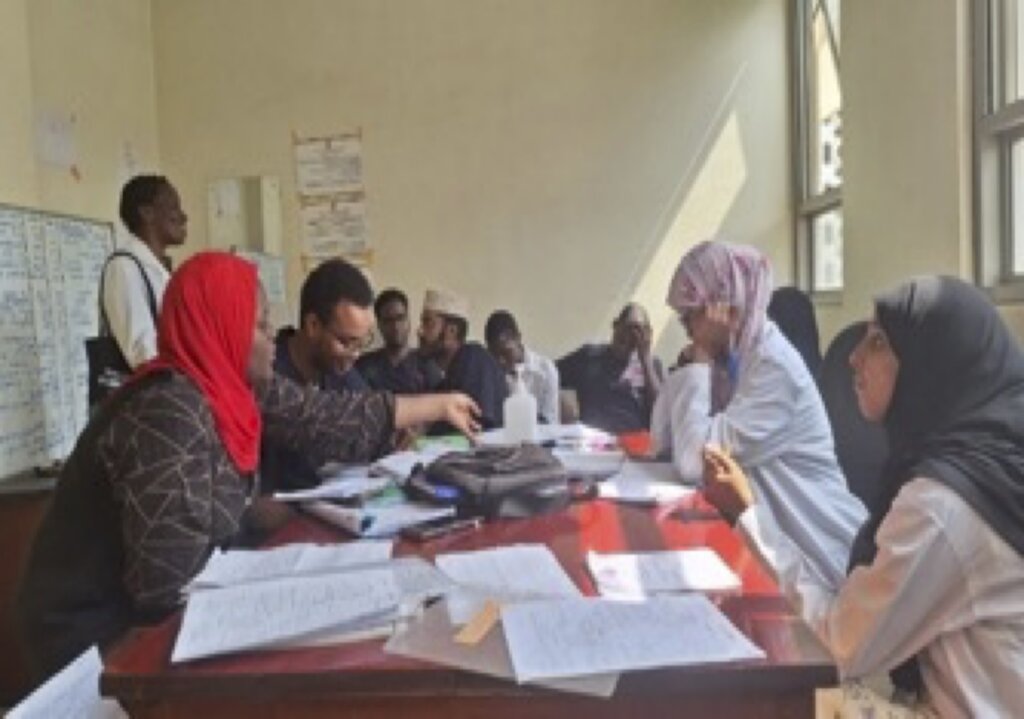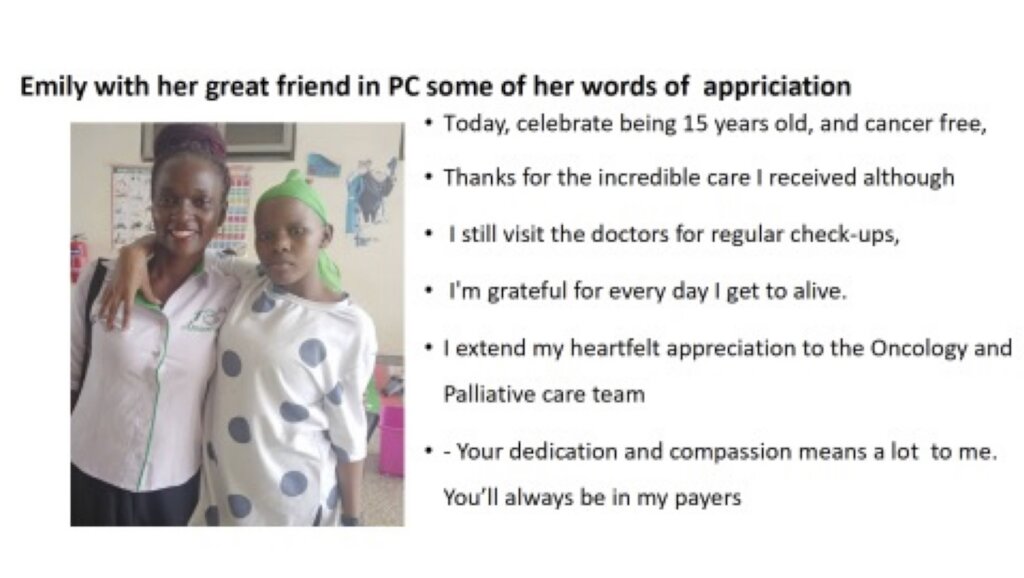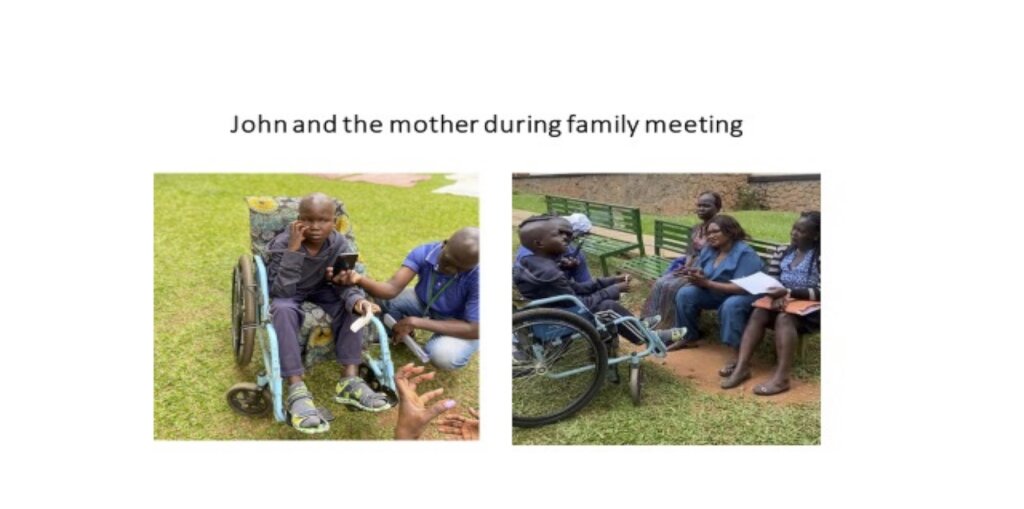By Florence | Project Participant
On behalf of Palliative care Education and Research Consortium (PcERC), we are pleased to share our progress in providing comprehensive palliative care services to terminally ill patients, including both adults and children.
Clinical care
PcERC a centre of excellence offers specialised, evidence-based palliative care for patients and families in need hence improves access to quality care in Mulago and Kiruddu National Referral Hospitals. During the period of four months: October 2024 – January 2025 the palliative care unit in both National Referral Hospitals (Mulago and Kiruddu) cared for 268 and 528 family care givers. In the past 4 months we cared for 50 children and have been participating in a study implementing the children’s palliative care outcome scale (C-POS). The Link Nurses and primary care workers who are practicing generalist palliative care have taken care of 380 patients and among these 48 were referred to us for specialist care and the rest were treated and discharged appropriately.
Sarah and Emily's story is a testament to the power of love and resilience
Emily a bright and cheerful 12-year-old suddenly began experiencing persistent fatigue and weakness over several weeks, prompting her mother to seek medical attention and schedule a hospital visit. Emily says:
“After conducting some tests, the doctor invited us to have a private discussion about the results in his consultation room. The doctor explained that I had leukaemia, a type of cancer that affects the blood”. My mom was so devastated and she started crying, and I could see the fear in her eyes but she knew she had to be strong for me. I began chemotherapy treatment and my mother received detailed information about my care and what to expect.
At first, I didn't fully understand what was happening. All I knew was that I had to go to hospital for treatment. However the treatment proved to be incredibly challenging. There were times when I felt like giving up, overwhelmed by the intense pain and exhaustion. It seemed like too much to bear, I soon realized that cancer wasn't just a physical battle but also an emotional and spiritual one. There were times when I felt angry, scared, and uncertain about the future. But my mom was always there to help me to stay positive. She reminded me of my strength and assured me that I could get through this. Her encouragement gave me the courage to keep fighting and to never give up. My mom was always there for me. She held my hand through every treatment, hospital stay, and bad day. Her un wavering support made me feel like I wasn't alone, that I had someone who cared about me no matter what”. As she began her treatment, her mother was her primary caregiver. Sarah, Emily’s mother devoted countless hours by her side, holding her hand, gently wiping away her tears, and reassuring her that everything would be okay.
Despite the numerous challenges they faced, Sarah made it a priority to cherish every precious moment with Emily, creating lasting memories amidst the difficulties. Sarah brought joy to Emily by decorating her hospital room, with vibrant balloons and reading her favourite books and stories aloud every day. As Emily's treatment progressed she began experiencing harsh side effects such as hair loss, heartbroken but determined, Sarah knew she had to be strong for her daughter. In a powerful show of solidarity Sarah shaved her own head standing by Emily’s side through every challenge. Emily was touched by her mother's gesture, and this brought both of them even closer. As Sarah and Emily navigated the ups and downs of cancer treatment, they became a beacon of inspiration to everyone around them. Their bond grew stronger with each passing day, and they found joy in life‘s simple pleasures: watching sunsets together, playing with a dolls and cuddling on the couch.
After months of tough treatment, Emily finally went into remission and Sarah was overwhelmed with joy at the news. Although they still had to navigate the aftermath of treatment including frequent doctor's appointments and ongoing medication, Sarah and Emily remained an unbreakable team. Together they faced every challenge that came their way, their bond growing stronger with each passing day.
As Emily grew stronger and healthier, she began to grasp the full extent of her mother’s sacrifices. She saw the exhaustion in her mother's eyes, the worry etched on her face, and the unconditional love that radiated from her heart. Emily’s new found awareness filled her with gratitude and affection for the selfless woman who had who stood by her side through the darkest of times.
To express her gratitude, Emily showered her mother with affectionate gesture. She gave her a big hug, drew a heartfelt picture, and whispered “I love you, Mommy. Simple yet powerful expressions of her appreciation for her mother’s unwavering love and support. A reminder that even in the darkest times, love can shine through.
Palliative care at all time: pre- bereavement restores hope
A 16-year-old patient, John, was referred to the palliative care unit with relapsed myeloid leukaemia, which had progressed to the point of paraplegia. Despite his physical limitations, John's mother proudly shared that he was an exceptional student, consistently ranking among the top three in his class. Although his illness forced him to drop out of school in senior one, John's aspirations remained strong, with a dream of becoming a pilot. His mother noted that John was hopeful that a bone transplant would enable him to achieve his goals.
Caring for children with relapsed disease poses significant challenges for healthcare providers, including conducting family meetings and disclosures without causing emotional distress. To address these challenges, the clinical team provides pre-bereavement support and refers complex cases to the palliative care unit for comprehensive palliation. This approach ensures children receive specialised care and support to manage their symptoms, emotional, and psychological distress. Effective care requires a delicate balance of compassion, empathy, and expertise, highlighting the need for specialised training and mentorship for healthcare providers. Patient John 16 years presented with a relapsed myeloid leukaemia, and by the time the palliative care team received his consult he was paraplegic but his mother explained to us that, “John was a very brilliant boy ever ranking in the first 3 positions during exams.” He had stopped in senior one but his dream was to become a pilot and was hopeful that as soon as his bone transplant is done.
John and his mother were visibly distressed, revealing that they had lost contact with a potential sponsor for his bone transplant. Despite the oncology team's efforts to secure funding, the advanced stage of John's disease made it impossible to proceed. Initially, John and his mother were unaware of the situation, and they continued to request updates from the oncology team. After a sensitive disclosure, they came to terms with the reality of John's condition. The palliative care team assured them that they would continue to provide supportive care through digital technology, manage treatable symptoms, and be available for any future needs.
The oncologist maintained regular check-ins with John and his mother until his passing last month. Thankfully, John's final days were pain-free, and he can now rest in peace.
Social worker’s experience
Ronald a volunteer for 13 years in Mulago palliative care unit was able to be part of a dedicated team that provides care and support to patient’s facing life limiting illness. This experience allowed him to gain valuable insight into the challenges and rewards of palliative care, while making meaningful contributions to the lives of individuals who need compassionate support during a difficult time.
“During my time as a volunteer at Mulago palliative care unit, I have adapted the team’s high standards of professionalism which I now consistently apply when attending to my patients and among the skills attained is assessing psychosocial and spiritual needs as these can worsen phyiscal needs therefore I have learnt to use good communication skills, being compassionate and empathetic is the most profound aspect of palliative care where a service provider has to be compassionate and empathetic in order to offer excellent emotional support. Palliative care can be emotionally challenging especially when witnessing patients and families going through tough times. Therefore, compassion is very important as it creates a bond between service providers, patients and their families.
Furthermore I work hand in hand with the palliative clinical team, social worker volunteer coordinator and hospital social workers to offer a holistic assessment / management to patients and their families using non-pharmacological measures. Some of the basic activities we offer include emotional support during the course of their treatment as a way of morally boosting, teaching different exercises, feeding patients, collecting medications and play therapy.
Teamwork has improved my skills in assessment / management of patients’ spiritual concerns: praying with patients and refer complex cases to their spiritual leaders. Initially I was so tensed up whenever the clinicians were breaking the bad news to patients and their families now I’m resilient I have learnt how to provide meaningful information to patients and families and I participate in breaking bad news and guiding patients and their families in decision making especially when going through challenging situations (during end of life). Effective communication skills is vital in this setting. I learnt how to communicate sensitively and respectively with patients and families especially when discharging, when discussing difficult topics such as end of life. I am now perusing my degree in social worker God.
Education activities
We provide comprehensive training and mentorship programmes for undergraduate and postgraduate students from Makerere University and the Islamic University in Uganda. During the 2024-2025 internship rotation, intern doctors, senior house officers, and nurses participated in the programme. Our training and mentorship initiatives equip future healthcare professionals with the necessary palliative care skills and competencies. By working alongside interns and students, we promote knowledge transfer and enhance their abilities, ultimately contributing to the integration and sustainability of palliative care in various healthcare settings. This period we have provided placements for students at Makerere and IUIU, nursing students at Mulago, Post graduate and intern doctors.
Additionally, the unit showed appreciation for its long-stay patients by providing them with edible gifts during Christmas, aiming to bring hope and joy to those in need.
Challenges faced by the unit
The palliative care unit faces a range of challenges that impact the delivery of quality care and we thank you for your support and in enabling us to provide care to our patients and their families.
Project reports on GlobalGiving are posted directly to globalgiving.org by Project Leaders as they are completed, generally every 3-4 months. To protect the integrity of these documents, GlobalGiving does not alter them; therefore you may find some language or formatting issues.
If you donate to this project or have donated to this project, you can receive an email when this project posts a report. You can also subscribe for reports without donating.
Support this important cause by creating a personalized fundraising page.
Start a Fundraiser

